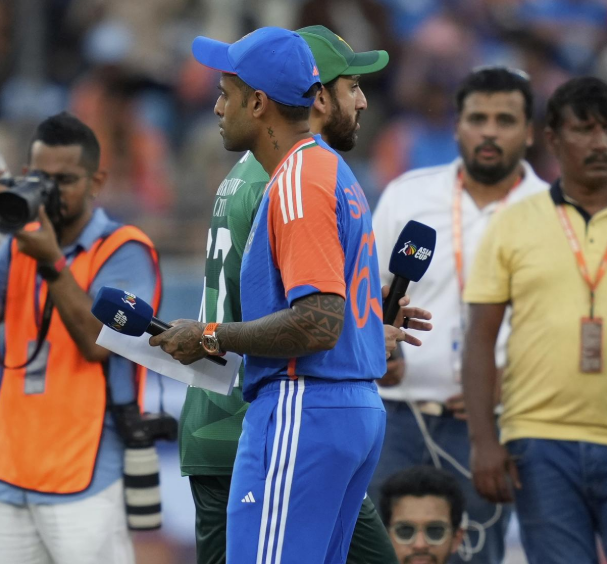
Star Indian batter Suryakumar Yadav is facing scrutiny after his offhand remark referencing “Pahalgam” led the International Cricket Council (ICC) to launch an inquiry. The incident has stirred widespread debate, underlining how even a casual comment by a sports personality can spark political ripples.
How the Controversy Started
Following India’s recent international fixture, Yadav engaged with the press in a routine media session. During the conversation, he made a passing reference to “Pahalgam,” a picturesque town in Jammu and Kashmir. While Yadav did not elaborate, the remark was quickly interpreted in ways that carried political connotations.
Clips of the comment circulated widely online, with reactions ranging from humor to outrage. The ambiguity of his words fueled speculation, with some reading it as a political statement and others dismissing it as harmless banter.
ICC’s Response
The ICC moved swiftly, summoning Yadav for a formal hearing. Under ICC regulations, players are prohibited from making political statements that may compromise the sport’s neutrality. The governing body noted that while Yadav’s words may not have been intentional, they nonetheless required clarification.
During the hearing, Yadav reportedly clarified that his remark had no political context. He said he mentioned Pahalgam as part of a casual conversation and never intended to offend. The cricketer added that he regretted the misunderstanding and respected the spirit of international cricket.
India Reacts Strongly
In India, the incident has triggered widespread discussion. Fans across social media platforms defended Yadav, criticizing the ICC for overreacting. They argued that cricket should not be reduced to nitpicking over words, especially when no explicit political statement was made.
Yet, analysts caution that given the sensitivities surrounding Kashmir, even unintended remarks can have ramifications. They urged athletes to remain mindful of the broader context in which their words are received.
BCCI’s Stand
The BCCI has stood behind Yadav, submitting its position to the ICC that the comment lacked malicious intent. Officials emphasized that the batter’s career has been free of disciplinary blemishes and that this incident should be treated as a minor misunderstanding.
At the same time, the BCCI is preparing to reinforce guidelines on public communications to players. Media training sessions are expected to focus more on avoiding casual remarks that could be construed as political.
Political Repercussions
The controversy has not escaped political framing. Several leaders criticized Yadav for being “irresponsible,” while others slammed the ICC for what they described as selective targeting of Indian cricketers. The remark has also reignited discussions about the intersection of sports, politics, and nationalism.
Voices from Kashmir
Reactions from the region itself have been varied. Some residents felt that Yadav’s words reflected insensitivity to Kashmir’s complex realities. Others dismissed the episode as a media-manufactured storm, pointing out that Pahalgam is better known for its scenic beauty and tourism than political disputes.
Reactions from the Cricket World
Players and commentators from across the cricketing world weighed in. Many expressed concern over how athletes’ casual words are increasingly scrutinized. “In today’s era, everything gets magnified. Athletes need to be trained not just in cricket but in communication too,” said a former England cricketer.
Meanwhile, a few voices supported the ICC’s move, noting that sports bodies have a duty to ensure neutrality and prevent potential flare-ups.
Fan Dynamics
The incident has further polarized cricket fans. While many stood firmly behind Yadav, others stressed that representing one’s country on the global stage requires heightened responsibility. Memes, debates, and hashtags around Pahalgam trended on Twitter, showcasing how quickly such controversies spread.
Next Steps by ICC
The ICC is reviewing the hearing transcripts and will issue a ruling soon. Possible outcomes range from a formal warning to disciplinary action. Analysts believe that a reprimand is most likely, with stricter penalties deemed unnecessary.
